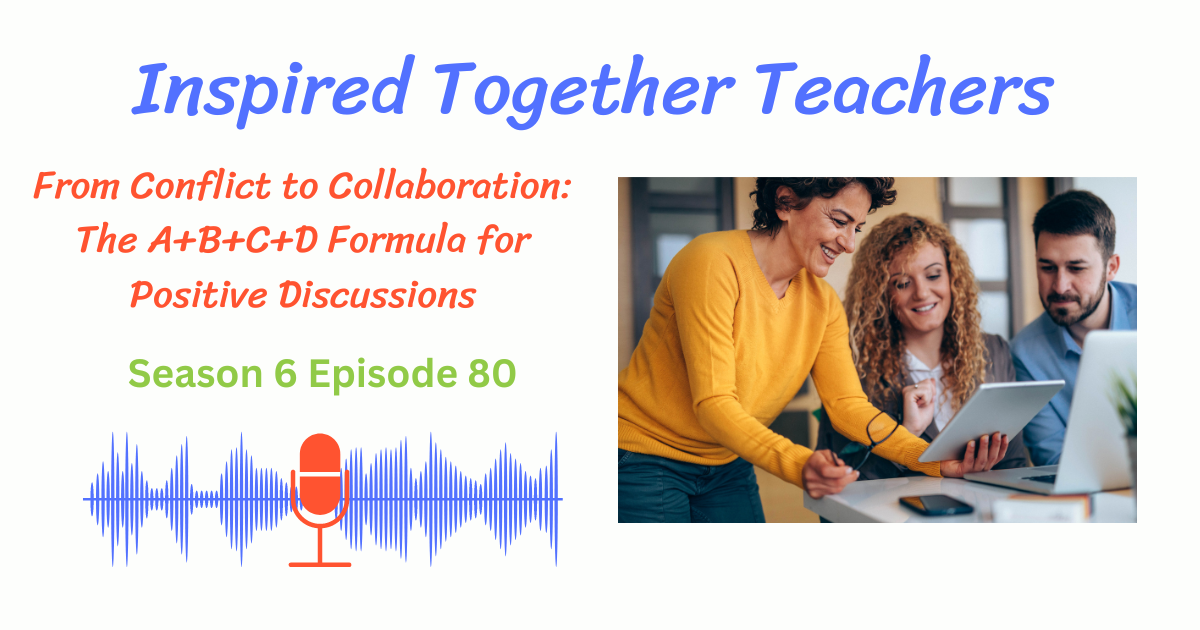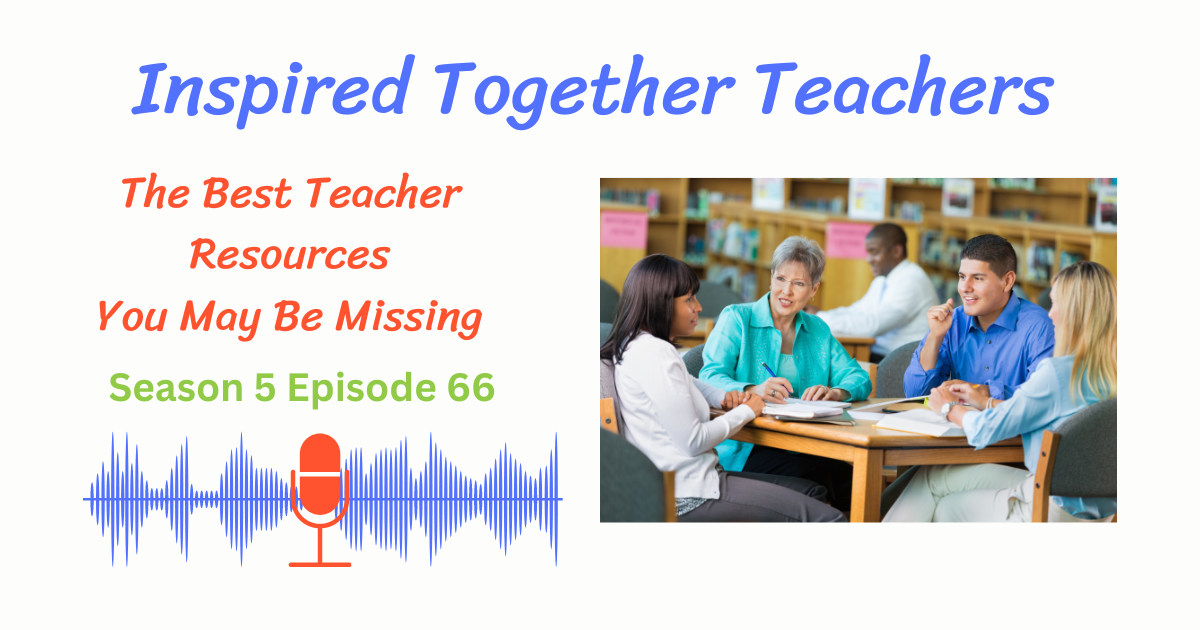From Conflict to Collaboration: The A+B+C+D Formula for Positive Discussions
Season 6 Episode 80
Check out this episode to learn four steps you can take to make sure you have positive discussions around topics that might be full of conflict!
Show Notes:
Episode Summary:
Have you ever engaged in an argument with someone about an educational issue? As teachers, we are constantly involved in discussions about education with our coworkers. It is the nature of what we do. But have you ever wondered how to stop arguing and engage in positive discussions?
While many of discussions in meetings are civil and productive, there are just as many that are unpleasant and unsettling.
Today, we explore ways to keep education conversations passionately positive instead of overwhelmingly negative. We’ll share an easy mnemonic you can use to make sure to avoid upsetting educational conversations and to add more of the positive conversations about teaching and education to your life. We all need more passion and positive discussions in our lives.
Introduction:
Education today is full of controversies. Our whole world is. Education, in particular, can draw a lot of controversy. From large controversial system issues, like how to teach reading or school vouchers, to smaller arguments over everything from handwriting to cafeteria caloric counts, there is always the chance that you will end up in a conversation about education that goes south fast.
While most of these discussions are civil and productive, some are just downright unpleasant and unsettling. You know the kind- you want to duck away, run away or look around for an invisibility cloak just to get out of the conversation. This is especially true when the person you are talking with appears to be settled into their convictions and aren’t even listening to what you are saying.
Examples of Negative and Positive Discussions
Paula: I would bet many of our listeners are nodding their heads right now. Just like the rest of you, I’ve have had my share of educational conversations over my years of teaching. The worst are those when someone derails the conversation from the beginning to steer it in a way that they want it to go so their side of the issue is the one that is at the center of the conversation.
Michele: As a reading teacher and reading specialist, I have had so many difficult conversations about reading. Often times, reading issues are not understood, somebody hasn’t read the research, they don’t understand what reading is all about. It is not about one skill, there are many reading skills that are combined when we teach reading well. Today it seems that we are focusing on phonics and phonics only. Let me be clear, I am in favor of teaching phonics, but it is NOT the only thing we should be teaching.
Paula: You have all probably witnessed firsthand how this negativity can happen between teachers. You know how that goes. One person starts complaining, the next agrees and the whole conversation becomes a list of grievances. By the end of the conversation, it can almost feel like the person who has the most misery tallies wins. I leave those discussions often angry or exhausted.
Michele: I get it that sometimes people just need to vent. Usually with our teacher friends or our teacher community, it is a safe place to vent. But when it becomes an ongoing negative discussion, it is no longer productive.
As part of our work, we often get to be part of discussions with educators who are passionate teachers and strong advocates. Not too long ago, we met with a few teachers to discuss an educational issue that was a hot topic, and that we all had strong feelings about.
One of two things could have happened. The conversation could have become passionately positive or overwhelmingly negative. We chose to be positive and all participants left the discussion feeling better than when we entered. It wasn’t pure luck that the conversation went that way. It was intentional.
So, we explored why that meeting, and others like it, went so well. That is where we came up with the formula we will teach you today.
We followed an algorithm-of-sorts for keeping discussions passionate and positive:
A + B + C + D= Passionately Positive Discussions
A= Always talk to the right people. If you want to be energized, pull people into the discussion who are both passionate and positive. The more positive voices in the conversation, the less likely negative voices are to speak up. You have heard us talk about negativity bias before but it is real and a conversation killer. If you look for the negative, you will be sure to find it. If you have enough positivity in the group, even those with less enthusiasm will feel the influence of the others and be inspired.
Paula: I happen to be a part of a team right now where everyone is passionately positive. Other times in my career I have been on teams that were not so positive. One person or two will bring the whole team down. In all ways possible, in all of your life, try to surround yourself with passionately positive people.
Michele: I just want to add that it doesn’t mean that we don’t want to hear differing opinions, or that we don’t care about people’s experiences, or that we don’t want to hear about the negative things so that we can fix them. It just means that those things we are listening to don’t deride everything else. It doesn’t turn into “poor, poor, pitiful me” or, “look at the terrible situation we are in and we can’t get out of it” kind of situation. You have to be able to hear the dissenting voice but keep the discussion around it positive.
Paula: Also, don’t surround yourself with just everyone who agrees with you. People can be positive and not agree with you.
B= Be clear about expectations. Establish ground rules for your discussion. It’s fine to start out the discussion by saying, “Let’s keep this positive. We’re all passionate about this topic AND we need to remember that we will get nothing accomplished if we turn this into a complaint session.” Being proactive and stating optimistic expectations upfront will be worth it. It is much more difficult to try and turn around a conversation once it has become hostile or depressing.
Paula: It’s like if you are in your class and one kid starts tapping his pencil very loudly. If you haven’t set the expectation that they shouldn’t disrupt others by doing things like tapping their pencil, to point it out then you are publicly singling out that student. The same is true in a conversation with your colleagues. If someone starts complaining and you haven’t set an expectation such as “let’s keep this positive”, and then you call them out publicly, things are going to to go down hill.
Michele: As you talk about that, I am thinking about how rare it is for leaders to start a meeting with setting expectations and setting some ground rules. When I think about some of the greatest leaders I have worked with, I realize that is exactly what they did. They set the task and how to go about it and they reminded people of some things like being civil. That’s a good way to focus.
Paula: You wouldn’t think you would have to do that, but it is really important because we are all so passionate about what we are doing. We are educators, this is our identity. If someone attacks our ideas or beliefs, it is really easy to react and not stop and think and then respond. But, if the expectation is don’t react, think, take a breath and then respond, that could change the whole conversation.
C= Concentrate on solutions. Recognize the problems and what led to them are there and they are real, but focus your passion and energy on the solutions. Too much dwelling on the problems can drain the group’s energy. Solutions, brainstormed by passionate advocates, are usually full of momentum, excitement, and promise. We love find and talking about good solutions.
Paula: I was teaching a pre-service teacher once who would go out and teach and come back after her lesson and she would say, ” Oh my gosh, Im freaking out, I’m freaking out…”
We taught her to shift her mindset to “don’t freak, solution seek”. She was able to come back into the classroom and say “ok, I’m solutions seeking.” It changed how her peers reacted to her. They didn’t know how to help her when she was “freaking out” but they could help with solutions. It became our class motto: “don’t freak, solution seek”.
Think of committees you might have served on at work or in your personal life, the ones that become complaint sessions. They are not likely to have time for seeking solutions. However, those that concentrate on solutions feel like a good use of your precious time. You don’t have a lot of time to sit around and complain. You need and want solutions.
Usually in the meetings where there is complaining, little gets done. When there is brainstorming filling those moments instead, a lot gets done.
We love this quote from motivational speaker Ralph Marston, which puts things into perspective. “Every moment spent in negativity is paid for with something truly priceless. That something is life.”
D= Don’t forget the food. If you want a positive discussion, bring food. There is a feeling of comradery when we share food around a table. Plus, it seems we are all a little more at ease with a chocolate or an appetizer or some snack in our hand.
Having a bagel or some treat at a breakfast meeting can set a positive tone. For example, we put candy on the tables at our workshops. People are always really happy because they don’t expect it and it is a special little treat. They always tell us how much they liked it.
All of these elements combined amount to an educational discussion that is passionate and positive.
This works best if you do all of these pieces. Since it is an equation, imagine that one of them is a 0. That one 0 drains from what could be a great sum.
We know it is a lot to remember all of the suggestions we gave here today. We suggest that you pause and quickly jot down the A, B, C and D so you don’t forget them. If you already forgot, no worries. We review them in the recap at the end of the episode so stick around for another minute.
Conclusion:
We end with this quote from Mahatma Gandhi “I will not let anyone walk through my mind with their dirty feet.”
We would argue that this same rule applies to conversations about education. Don’t let anyone walk through your education conversations with their dirty feet or sticky hands.
Choose passion and positivity and you can’t go wrong.
What additional components would you add to our algorithm to make educational discussions more passionately and positive? Please share with us, we love when people share ideas and follow up so please share with us. Are there specific educational topics that you avoid because they get negative or certain topics that you really turn into uplifting conversation? Tell us what they are so we can share! We also use your ideas for future podcast episodes.
We wish you many positive conversations in your near future.
Recap:
Following the A + B + C + D mnemonic will keep your discussions passionate and positive! Always talk to the right people. Be clear about expectations. Concentrate on solutions and don’t forget the food! If you do all of these, you won’t leave the space open for negative or unproductive educational discussions.
Quote:
“Every moment spent in negativity is paid for with something truly priceless. That something is life.”
Ralph Marston
Resources mentioned in this episode:
Inspired Together Teachers Blog: Don’t Freak Solution Seek
Connect with the Inspired Together Teachers Community:
Website: https:www.inspiredtogetherteachers.com
Instagram: Inspired-Together-Teachers
Facebook: Inspired Together Teachers
Inspired Together Teachers Network Facebook Group
Linked In: Inspired Together Learning
More About Inspired Together Teachers:
Are you a teacher struggling to balance your best work with your best life?
If you are dedicated and caring but often overwhelmed and exhausted, join us at Inspired Together Teachers. We’ll give you inspiration, strategies and tips that help you navigate life’s challenges as a stronger, more confident, and more joy filled person, both in and out of the classroom.
Inspired Together Teachers will give you practical tools to experience more of what matters most in your life.
Co-hosts Paula Schmidt and Michele Vosberg are award winning educators with the experience and skills to help teachers thrive in life and work. They’ve taught at all levels, worked with thousands of teachers, and conducted workshops around the world. They are also the authors of the #1 best-selling book The Inspired Teachers Journal: A Weekly Guide to Becoming Your Best Self.
Paula and Michele would love to have you to join them on their quest to lived inspired lives.






